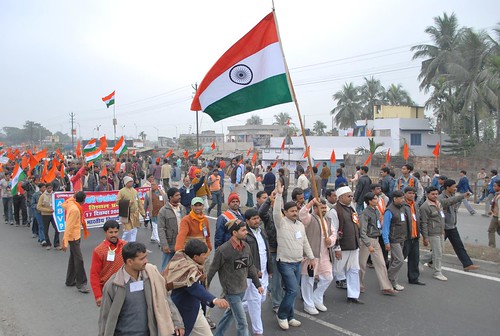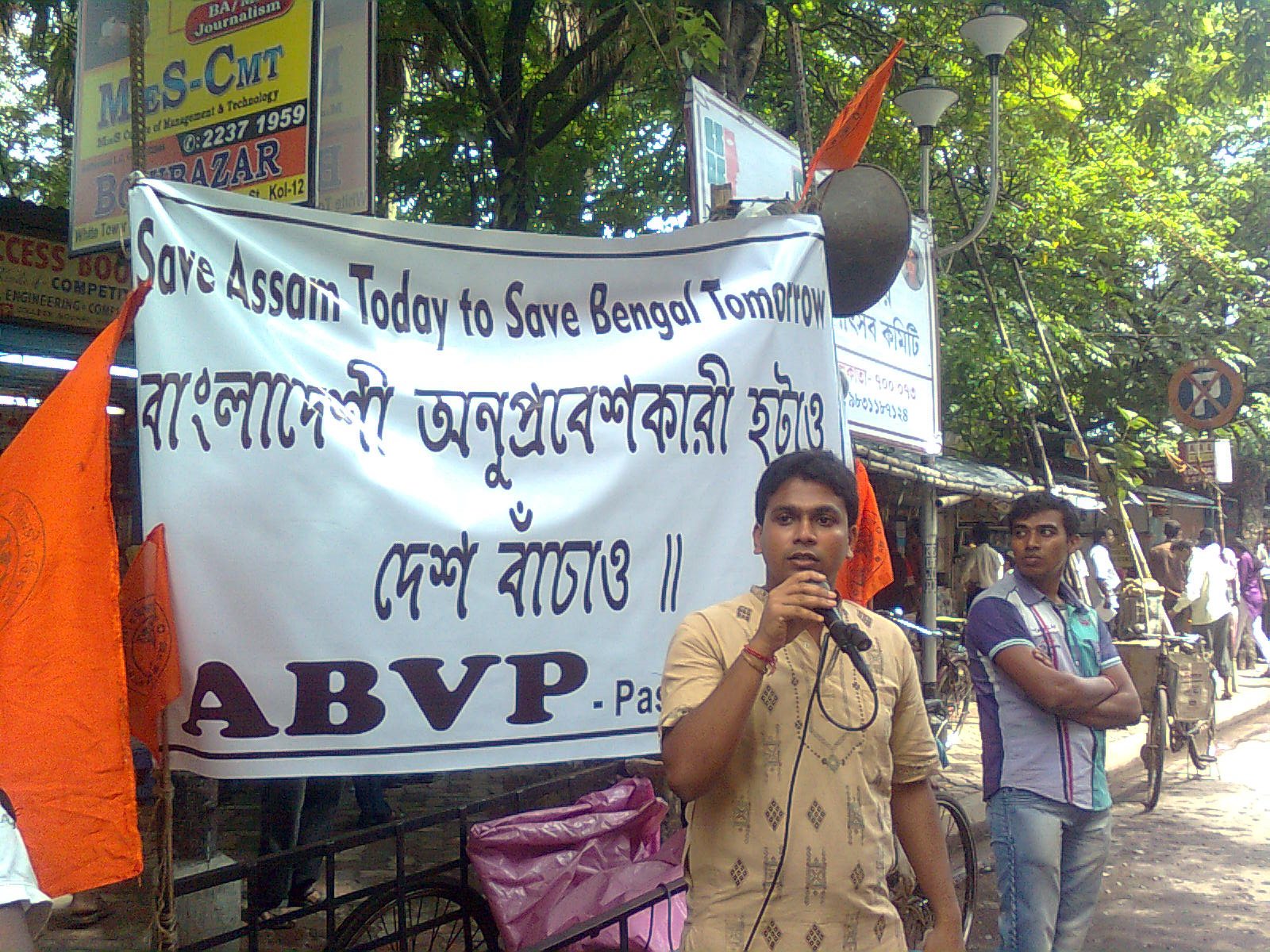Short answer: Most of you don't give two fucks unless it happens at an 'elite' institution. Bourgeois much?
Longer rant:
If you really want to know, this process of saffronisation has been going on for quite some time now. It's really shocking that people only start caring when it happens at places like FTII or IIT-Madras.
As of 2014, the ABVP has control of the students' unions in 15 out of the 30 Central Universities and many of the appointments at the authority level in these universities are former RSS pracharaks. From what I've heard from friends in Silchar studying at Assam University, the ABVP regularly harasses students affiliated with the Students' Federation of India with threats to severely compromise their academic lives. What's more is that with RSS pracharaks in the authority, they can if they really want to. The situation is hardly going to be better in any of the other 14 Central Universities where the students' body is controlled by the ABVP. But of course, Assam University is not a 'premier' institute, so you hardly give a shit.
People brushed off the presentation of 'Hindutva science' at the Indian Science Congress this year as a minor nuisance. While the entire scientific community was signing petitions regarding such a disturbing turn of events, where pseudoscience was being given a voice at the premier state sponsored scientific convention in the country, our merry band of pseudo-intellectuals decided not to give a fuck. No rallies there.
Nobody gave even a minor fuck about the fact that the Union slashed the overall health budget, but increased funding for AYUSH. Yes, if you think American conservatives are bad for their evolution and global warming denialism, you should know that India actually spends a shitload of money on education and research in homeopathy of all things(Quite literally, 'টাকা জলে দেওয়া'). Amusingly, a section of our secular, progressive intellectuals actually supported the cause of homeopathy colleges.
And it doesn't stop there. All this is not even the tip of the iceberg as far as saffronisation is concerned. Here comes the whopper:
Our conscientous Left (including the statist Left, revolutionary Left, searchist Left, anarchist Left, Left but not quite Left, Rightist Left etc.) has somehow not gotten the memo regarding the saffronisation of the school curriculum which really is the biggest problem as far as saffronisation is concerned.
What do you think is a bigger problem? Injecting Hindutva faculty into a premier institute, or the brainwashing of millions of impressionable children into an ideology of irrationality and hatred? Because if you're going with the obvious answer here, I don't see anybody protesting on the streets about the latter. You can at least trust people in college with their own political beliefs, you cannot expect schoolkids to rise up in protest because they're being taught irrationality and hatred.
As a matter of fact, the fact that you do not attack the disease at its roots has a major contribution to the fact that the same kids grow up and then turn entire university campuses to the religious right.
But unless it's one of your elite cultural icons of education, you are hardly bothered with what happens where. Some of the posters being shared by students elsewhere read, 'Ritwik Ghatak was here' and unless everyone knows about Ritwik Ghatak and his cinema, this has no meaning for the vast majority of college students out there. This cancerous elitism is really a thing, it's a fact that students in elite colleges consider their counterparts elsewhere to be really beneath their level, despite quoting Marx, Sartre or Ritwik Ghatak at the drop of a hat (I now believe this ability is a reason for the elitism, the irony...)
If the Left(all included, once again) keeps practising its politics of self-interest and bourgeois elitism, it shouldn't come as a surprise that the cultural right is making massive gains all across campuses.This elitism is toxic and self-defeating, the vast majority go to institutions that are not meant for intellectual Mandarins and it is this mass that later forms the backbone of the nation state.
No, please don't pretend like you care about the saffronisation of education if all you care about are its manifestations in your intellectual space. If you really care, address the root of the problem, about how even the less elite Central Universities are being saffronised, about how pseudoscience gets the same attention as modern science and most importantly about how schoolchildren grow up believing all of this and then propagate the same once they grow up.
Longer rant:
If you really want to know, this process of saffronisation has been going on for quite some time now. It's really shocking that people only start caring when it happens at places like FTII or IIT-Madras.
 |
| Gajendra Chauhan bothers you |
As of 2014, the ABVP has control of the students' unions in 15 out of the 30 Central Universities and many of the appointments at the authority level in these universities are former RSS pracharaks. From what I've heard from friends in Silchar studying at Assam University, the ABVP regularly harasses students affiliated with the Students' Federation of India with threats to severely compromise their academic lives. What's more is that with RSS pracharaks in the authority, they can if they really want to. The situation is hardly going to be better in any of the other 14 Central Universities where the students' body is controlled by the ABVP. But of course, Assam University is not a 'premier' institute, so you hardly give a shit.
 |
| This doesn't... |
People brushed off the presentation of 'Hindutva science' at the Indian Science Congress this year as a minor nuisance. While the entire scientific community was signing petitions regarding such a disturbing turn of events, where pseudoscience was being given a voice at the premier state sponsored scientific convention in the country, our merry band of pseudo-intellectuals decided not to give a fuck. No rallies there.
 |
| Neither does this... (Hey! Isn't that College Street?) |
Nobody gave even a minor fuck about the fact that the Union slashed the overall health budget, but increased funding for AYUSH. Yes, if you think American conservatives are bad for their evolution and global warming denialism, you should know that India actually spends a shitload of money on education and research in homeopathy of all things(Quite literally, 'টাকা জলে দেওয়া'). Amusingly, a section of our secular, progressive intellectuals actually supported the cause of homeopathy colleges.
And it doesn't stop there. All this is not even the tip of the iceberg as far as saffronisation is concerned. Here comes the whopper:
Our conscientous Left (including the statist Left, revolutionary Left, searchist Left, anarchist Left, Left but not quite Left, Rightist Left etc.) has somehow not gotten the memo regarding the saffronisation of the school curriculum which really is the biggest problem as far as saffronisation is concerned.
 | |
| Nor that this guy, who had Wendy Doniger's book banned, decides what millions of kids study. |
What do you think is a bigger problem? Injecting Hindutva faculty into a premier institute, or the brainwashing of millions of impressionable children into an ideology of irrationality and hatred? Because if you're going with the obvious answer here, I don't see anybody protesting on the streets about the latter. You can at least trust people in college with their own political beliefs, you cannot expect schoolkids to rise up in protest because they're being taught irrationality and hatred.
As a matter of fact, the fact that you do not attack the disease at its roots has a major contribution to the fact that the same kids grow up and then turn entire university campuses to the religious right.
But unless it's one of your elite cultural icons of education, you are hardly bothered with what happens where. Some of the posters being shared by students elsewhere read, 'Ritwik Ghatak was here' and unless everyone knows about Ritwik Ghatak and his cinema, this has no meaning for the vast majority of college students out there. This cancerous elitism is really a thing, it's a fact that students in elite colleges consider their counterparts elsewhere to be really beneath their level, despite quoting Marx, Sartre or Ritwik Ghatak at the drop of a hat (I now believe this ability is a reason for the elitism, the irony...)
If the Left(all included, once again) keeps practising its politics of self-interest and bourgeois elitism, it shouldn't come as a surprise that the cultural right is making massive gains all across campuses.This elitism is toxic and self-defeating, the vast majority go to institutions that are not meant for intellectual Mandarins and it is this mass that later forms the backbone of the nation state.
No, please don't pretend like you care about the saffronisation of education if all you care about are its manifestations in your intellectual space. If you really care, address the root of the problem, about how even the less elite Central Universities are being saffronised, about how pseudoscience gets the same attention as modern science and most importantly about how schoolchildren grow up believing all of this and then propagate the same once they grow up.


